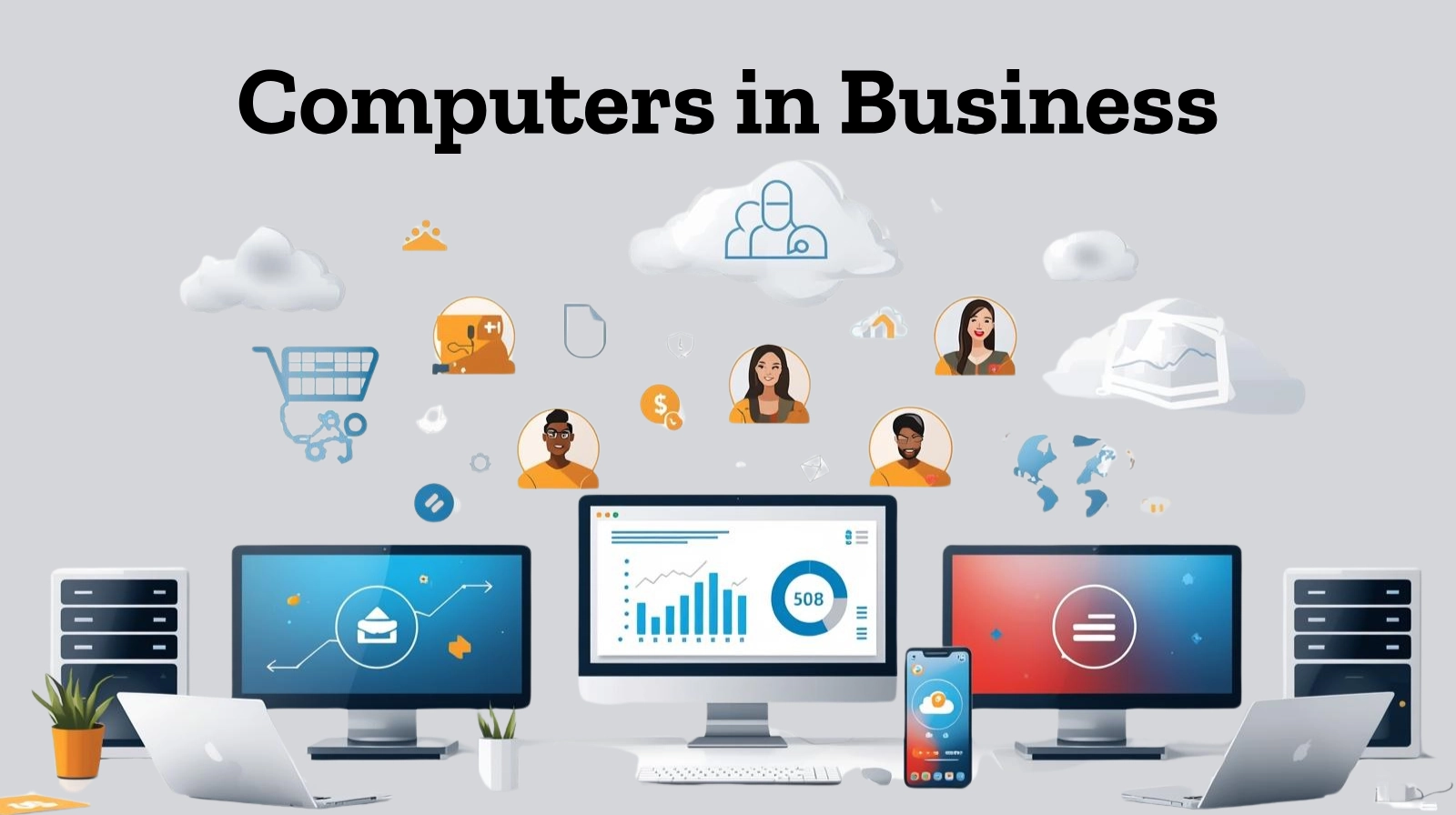Computers in Business: Powering Innovation and Growth
Published: 2 Oct 2025
Computers have changed the way businesses work. In the past, companies depended on manual records and slow processes. Today, computers make business tasks faster, easier, and more accurate.
The role of computers in business is now essential. They help with data, communication, customer service, and decision-making. Without them, the importance of computers in business cannot be ignored.
This article will explain the role, uses, benefits, challenges, and future of computers in business.
What Does “Computers in Business” Mean?
The definition of computers in business is simple. It means using computers to manage and support different parts of business work. Computers are not only for typing or storing data. They help with communication, online sales, marketing, record-keeping, and customer support.

The use of computers in business goes far beyond basic tasks. From small shops to global companies, computers play a central role in planning, managing resources, analyzing data, and making smart decisions. In short, they are the backbone of modern business operations.
- Communication: Sending emails, video calls, and instant messaging with employees and customers.
- Data Management: Storing, organizing, and securing business records digitally.
- Financial Work: Managing budgets, invoices, payroll, and online transactions.
- Marketing: Running digital ads, social media campaigns, and tracking customer engagement.
- Decision-Making: Using data analysis and reports to make better business strategies.
History of Computers in Business
The history of computers in business shows how technology entered offices step by step. At first, only big companies used large machines for accounting. Later, smaller businesses adopted computers for daily tasks.
The evolution of computers in business can be seen in the shift from typewriters to PCs, then to internet tools and modern software. Today, businesses depend on computers for nearly everything.
- Early Machines: In the 1950s and 60s, big companies used mainframes for payroll and calculations.
- Office Shift: By the 1970s and 80s, typewriters were replaced with PCs for faster document creation.
- Internet Age: The 1990s brought email, websites, and online transactions into business operations.
- Software Growth: Businesses started using accounting, HR, and project management software.
- Modern Dependence: Today, companies of all sizes rely on computers for communication, sales, and global connections.
Uses of Computers in Business
The uses of computers in business are vast and touch every part of a company. They help in communication, data management, finance, marketing, and customer service to make operations faster and smarter.
- Communication:
The role of computers in communication is vital for modern businesses. Emails, video calls, and instant messaging make it easy to connect with employees, clients, and partners. Businesses can maintain business communication with computers globally in real-time. - Data Management:
Computers help in business data management by storing, organizing, and analyzing large amounts of information. Using a computer in record-keeping reduces errors and saves time. - Finance and Accounting:
Computers in accounting simplify tasks like online banking, payroll, and preparing financial reports. They make financial management with computers faster, more accurate, and reliable. - Marketing and Advertising:
The role of computers in advertising is huge today. Computers are used in digital marketing, social media campaigns, and tracking analytics. Computers in marketing help businesses reach the right audience efficiently. - Customer Service:
Computers improve customer service through chatbots, CRM software, and quick responses to queries. CRM in business ensures better customer management and satisfaction.
Types of Computers Used in Business
Businesses use different computers for different tasks. Knowing the types of business computers helps choose the right system for each need.
- Desktops and Laptops: Used for everyday office tasks like emails, documents, and meetings.
- Servers and Mainframes: Handle large amounts of data and run critical applications.
- Mobile Devices and Tablets: Provide flexibility, allowing work from anywhere.
- Cloud Computers: Enable remote access, collaboration, and online storage.
Modern business computer systems combine these types to improve efficiency and productivity.
Benefits and Limitations of Computers in Business
Computers bring speed, accuracy, and efficiency to business operations. However, they also come with some challenges that companies must manage.
| Benefits | Limitations |
| Complete tasks faster and reduce manual work. | Buying and maintaining computers can be expensive. |
| Minimize human errors in data and calculations. | System failures or software bugs can disrupt work. |
| Easier connection with employees, clients, and partners. | Sensitive data can be hacked if not properly protected. |
| Organize and analyze large amounts of information. | Over-reliance on computers can cause problems if they fail. |
| Reach customers online and track engagement. | Employees must learn to use new systems effectively. |
Role of Computers in Different Business Sectors
Computers play a key role in almost every business sector, making work faster, easier, and more accurate.
- Retail: Computers manage online stores, billing systems, and inventory efficiently.
- Banking and Finance: Computers in banking help with online transactions, ATMs, and secure record-keeping.
- Healthcare: Computers in healthcare store patient records, manage appointments, and support telemedicine.
- Education Businesses: The role of computers in the education business includes online courses, e-learning platforms, and digital assessments.
- Transportation and Logistics: Track shipments, manage reservations, and optimize routes using computer systems.
Future of Computers in Business
The future of computers in business is exciting, with new technologies making operations smarter and faster. Businesses will rely more on automation, cloud tools, and data-driven decisions.
- Artificial Intelligence & Automation: Business automation with computers will handle repetitive tasks, improving efficiency.
- Cloud-Based Offices: Work and store data online, allowing teams to collaborate from anywhere.
- Remote Work & Digital Teams: Computers enable global teams to work together in real-time.
- Smart Data Analytics: Analyze large datasets to make better business decisions and strategies.
- Internet of Things (IoT): Connect devices and machines to computers for smarter operations and monitoring.
Conclusion
Here, we looked at the role of computers in business. Computers are vital for every business, helping improve efficiency, communication, and decision-making. The importance of computers for business growth is clear.
The role of technology in business keeps expanding, making computers the backbone of modern companies.
Harness computers today and take your business to the next level!
FAQs
Want to know more? These FAQs reveal how computers boost every business!
Computers are important in business because they make work faster and more accurately. They also help manage data, communicate, and make better decisions.
Computers are used in business to handle tasks like communication, data management, marketing, and financial work. They also help improve efficiency and support decision-making.
The role of computers in business communication is to connect employees, clients, and partners quickly through emails, video calls, and messaging. They make communication faster, clearer, and possible across the globe.
IT is used in business to manage data, run software, and support communication and operations. It also helps improve efficiency, security, and decision-making.
The role of computers in management is to help plan, organize, and monitor business activities efficiently. They assist managers in decision-making, tracking progress, and analyzing data.
Businesses depend on computers to handle daily operations, manage data, and communicate efficiently. They also rely on them for marketing, financial management, and decision-making.

- Be Respectful
- Stay Relevant
- Stay Positive
- True Feedback
- Encourage Discussion
- Avoid Spamming
- No Fake News
- Don't Copy-Paste
- No Personal Attacks

- Be Respectful
- Stay Relevant
- Stay Positive
- True Feedback
- Encourage Discussion
- Avoid Spamming
- No Fake News
- Don't Copy-Paste
- No Personal Attacks





